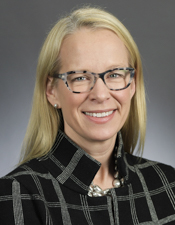House member hopes bill will spur discussion about end-of-life plans
At the end of their lives, people are often faced with difficult choices about how they will die. Medical science can prolong life in many cases. But would you want to be kept alive by machines or other invasive procedures when there’s no hope for recovery or decline those aggressive interventions and be made as comfortable as possible?
It’s a tough question to answer but, often, a necessary one. And also, far too often, it’s a question that goes unanswered for people who become incapacitated and can no longer make those decisions for themselves. The tough choices fall instead on loved ones who have to do their best to determine what someone would have wanted done, often adding a tremendous burden in an already terrible time.
A simple conversation can be all it takes to help prevent these situations, and HF2670, sponsored by Rep. Kelly Morrison (DFL-Deephaven), is intended to spur those conversations by requiring health insurance plans to include advance care planning services in their coverage.
The House Preventive Health Policy Division heard the bill on an informational basis Wednesday, although it currently awaits action by the House Commerce Finance and Policy Committee. There is no Senate companion.
Advance care planning services would involve a discussion with a health professional about the patient’s wishes should they become unable to make decisions about their care in the future. That discussion would include how the patient can let others know about their preferences, an explanation of health care directives and similar documents, and completion of those documents.
Morrison, who is a physician, said planning conversations are crucial so that people are educated about end-of-life issues and can make informed decisions about the care they may need. She said the bill is also about equity as research has shown that people of color and the LGBTQ+ community face barriers to end-of-life care.
“There is tremendous comfort, for both the individual and the family, to know how the person feels about what their wishes are so that the best plans can be made to honor those,” Morrison said. “So this is a critically important conversation that all of us need to be having, and if there’s not reimbursement for it, unfortunately, they’re not going to happen in many cases.”
Dr. Robert Moravec, an emergency medicine physician who practices at St. Joseph’s Hospital in St. Paul, where he was also medical director and chair of its ethics committee, testified in support of the bill. He told members advanced care planning is the mechanism to document one’s preferences, beliefs, values and provides a method of shared decision making between a patient and their physician.
Patients who lose the power to speak for themselves can designate someone to make decisions for them using a durable power of attorney or an advanced directive document, sometimes called a living will.
“I ask you to pass this bill in support of those patients with limited access to their health care clinic, either through geography or through cultural barriers,” he said. “It would assist clinics in providing resources and materials that would give physicians incentives during their visits with patients to open the discussion and encourage questions about goals of treatments, about expectations of interventions and documentation of those discussions.”
Rep. Glenn Gruenhagen (R-Glencoe) is not comfortable with the bill mandating that insurance must cover advanced care planning services, which he agrees are important, because it would raise health care costs and premiums.
“I think it’s a valid discussion to have, but I just am uncomfortable with a mandate,” he said.
Rep. Josh Heintzeman (R-Nisswa) asked Morrison if the bill has a path forward this session since there is no companion bill in the Senate and committee deadlines are fast approaching.
Morrison said she hopes the bill could advance, but also hopes it would provoke discussions of the issue at the Capitol and, ultimately, among Minnesotans.
Related Articles
Search Session Daily
Advanced Search OptionsPriority Dailies
Speaker Emerita Melissa Hortman, husband killed in attack
By HPIS Staff House Speaker Emerita Melissa Hortman (DFL-Brooklyn Park) and her husband, Mark, were fatally shot in their home early Saturday morning.
Gov. Tim Walz announced the news dur...
House Speaker Emerita Melissa Hortman (DFL-Brooklyn Park) and her husband, Mark, were fatally shot in their home early Saturday morning.
Gov. Tim Walz announced the news dur...
Lawmakers deliver budget bills to governor's desk in one-day special session
By Mike Cook About that talk of needing all 21 hours left in a legislative day to complete a special session?
House members were more than up to the challenge Monday. Beginning at 10 a.m...
About that talk of needing all 21 hours left in a legislative day to complete a special session?
House members were more than up to the challenge Monday. Beginning at 10 a.m...
